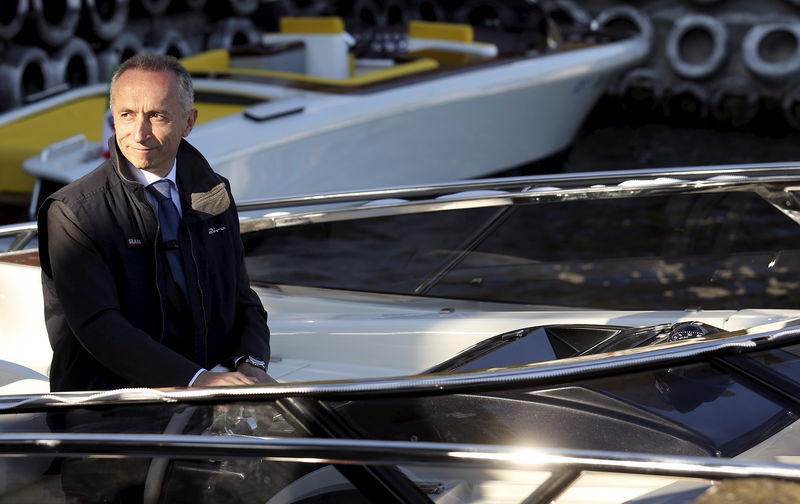By Agnieszka Flak and Aradhana Aravindan
SARNICO, Italy/SINGAPORE (Reuters) - When Chinese industrial conglomerate Weichai Group snapped up cash-strapped Italian luxury yacht builder Ferretti in 2012, the deal looked like a match made in heaven.
Debt-laden Ferretti, known for the elegant Riva speedboats favored by film star Sophia Loren, was the world's top maker of large motor yachts and cash-rich Weichai saw an opportunity to offer luxury leisure to the growing ranks of Chinese billionaires.
Three years on, wealthy Chinese are yet to fully embrace the appeal of messing about in boats and Ferretti, which has since slipped to No.3 among global super yacht builders according to an annual order book survey by industry publisher Boat International, is still loss-making.
"The market is not that big, the market is not that fast," said Fabiomassimo Discoli, a Hong Kong-based sales manager for Ferretti, adding that the company had found it needed to adapt its boats to the different tastes of Asian owners, especially mainland Chinese.
"They don't sleep on board and just use the boats for entertainment purposes," said Discoli, speaking at the Singapore Yacht Show aboard a 21-metre (69 ft) Ferretti Yachts 690 that carried a 3 million euro price tag. "They bring their customers... do karaoke ... and smoke cigars."
The example of Ferretti underscores the difficulties Chinese buyers face in extracting quick returns from a global brand at a time when they are gobbling up Western assets as never before.
The weak euro is making companies in countries such as Italy or Portugal attractive, as the March purchase of tyremaker Pirelli by China National Chemical Corp shows. Chinese buyers poured $18.8 billion into European assets in 2014, the highest since 2008, and topped that figure in the first half of 2015 alone, Thomson Reuters data shows.
But financial muscle alone is not enough to master a brand, and question marks hang over the ability of many Chinese buyers to leverage exports into their home market in times of slow growth.
Ferretti Chief Executive Alberto Galassi, appointed by Weichai in May last year to try to revive the Italian group's fortunes, expects the company to return to net profit in 2017.
Weichai's original Ferretti management team had envisaged the firm breaking even by the end of 2013.
"The Chinese bought an industrial plan that after two years did not produce results," Galassi said in an interview at the firm's historic Riva shipyard in Sarnico, on the shores of Lake Iseo in northern Italy. "They value their investment but they also want returns."
Weichai declined to comment.
A MILLION MILLIONAIRES
China has more than 1 million millionaires and 67,000 super-rich with 100 million yuan ($16 million) or more, according to the 2014 Hurun Wealth Report, an annual China rich list.
But the number of luxury yachts sold is still low. Only around 0.3 percent of Chinese with financial assets of at least $1 million own a yacht, according to a 2011 study by the Italian Trade Commission.
The problem is partly cultural. For Europe's wealthy boat owners, sleek motor yachts conjure images of lazy family holidays along the sun-kissed Mediterranean coast.
Well-off Chinese tend to shun the sun, China's coastline lacks the appeal of southern Europe or Thailand and a boat is seen more as a business asset than a family plaything.
Taking out a client on a yachting trip has also become less socially acceptable since Chinese President Xi Jinping ramped up a crackdown on corporate corruption, leaving many fearful of becoming a target of official scrutiny.
"The current mood in China is not about conspicuous spending," said Jean-Marc Poullet, the Asia chairman-designate of Burgess, a yacht brokerage.
To address some of these issues, Ferretti is building a marina in Zhuhai, in China's southern Guangdong province, where it plans to set up a plant to develop a new model for the local market by 2018.
A Chinese plant should also help overcome another problem, China's 43 percent import tax on luxury goods.
Besides the 374 million euros ($419 million) spent on the acquisition, Weichai invested another 80 million euros via a capital increase, the bulk of which will be used to develop 27 new models over three years. The firm's seven brands include Riva, Ferretti Yachts, Pershing and Itama.
Ferretti has nonetheless scaled back its expectations for the Asia-Pacific region to only around 15 percent of global sales, half what it originally forecast, and shelved plans for a Hong Kong listing.
It also declined to disclose sales figures for China.
Local politicians and unions - who clashed with company in the early days of Weichai's ownership over a since-abandoned plan to close one of its Italian yards - now welcome the fact that Ferretti was saved by an industrial partner. But for the company to continue to operate in Italy, known for high labor costs and high taxes, the turnaround has to work.

"There is always the worry that the Chinese could just take our know-how," said local union leader Luigi Giove. "But we should not forget that them coming in was a turning point for a group that was on the brink of collapse."